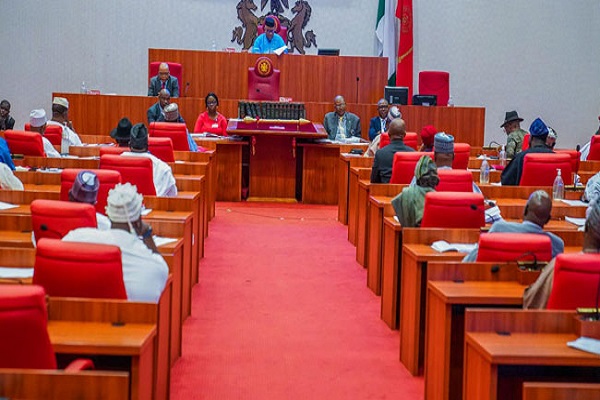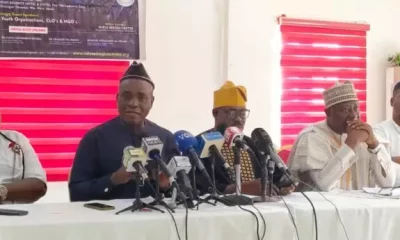News
Over 70m Nigerians Extremely Poor – World Poverty Clock

The number of extremely poor Nigerians currently stands at 71 million, according to 2023 data from World Poverty Clock.
The World Poverty Clock is a tool to monitor progress against poverty globally.
Tonye Cole, governorship candidate of the All Progressives Congress (APC) in Rivers State, who quoted the data also said the National Bureau of Statistics (NBS) classes 133 million people as multidimensionally poor.
He spoke Saturday in Abuja, at the Nigeria Zero Hunger Symposium, organised by T200 Foundation to mark World Hunger Day and unveiling of Nigeria’s hunger report.
Quoting the United Nations (UN), Cole said globally, 25,000 die daily from hunger, including more than 10,000 children.
According to him, Nigeria must design a simple, implementable, and sustainable poverty eradication model and stick to it over time.
He said, “Nigeria has the awful distinction of being the world capital of poverty, with 71 million people living in extreme poverty today (World Poverty Clock, 2023) and a total of 133 million people classed as multidimensionally poor according to National Bureau of Statistics data.
“In other words, about 828 million people will wake up every day having no idea when or where their next meal will come from, and many will go to bed that day without eating anything. This is according to a 2021 UN report. The UN further states that of these 828 million people, 25,000 will die today, including more than 10,000 children.
“Nigeria must design a simple, implementable, and sustainable poverty eradication model and stick to it over time.
“Other factors that contribute to hunger, such as violence, weak government, and health-care systems, must be addressed promptly if zero hunger is to be achieved. These are real difficulties in Nigeria and addressing them is critical not only for hunger eradication but also for the country’s overall progress.
“President Bola Ahmed Tinubu’s (GCFR) government is well positioned to push the goal of strengthening democratic institutions that will yield democratic dividends to the Nigerian people.”
According to the report by T200 Foundation, Nigeria has a Global Hunger Index score of 27.9, which falls into the serious hunger category. However, there are significant variations in the hunger index score across states.
It said the state with the highest hunger index score is Yobe, with a score of 44.2. Yobe also has the highest prevalence of undernourishment, which is 27.4%. This is more than twice the national average of 12.9%. Yobe also has the highest child-wasting rate of 22.5%, which is almost three times the national average of 7.9%.
Also, the state with the second-highest hunger index score is Sokoto, with a score of 42.1. Sokoto also has a high prevalence of undernourishment, which is 24.4%. The child wasting rate in Sokoto is 18.4%, which is more than twice the national average.
The report added that other states with high hunger index scores include Zamfara (37.2), Kebbi (34.5), and Jigawa (33.9). These states also have high rates of undernourishment and child wasting.
Amb. Emmanuel Osadebay, Executive Director T200 Foundation, said Nigeria needs collaboration among stakeholders to end hunger by 2030 in accordance with the Sustainable Development Goals (SDGs).
Headline
Prince Harry visits sick Nigerian soldiers in Kaduna

Prince Harry and his team visited the 44 Nigerian Army Reference Hospital in Kaduna to interact with wounded soldiers who are receiving treatment.
The Duke of Sussex is in Nigeria with his wife to champion the Invictus Games, which Harry founded to aid the rehabilitation of wounded and sick servicemembers and veterans.
Nigeria joined the Invictus Community of Nations in 2022 becoming the first African country to join.
Prince Harry’s visit to Kaduna came 68 years after his late grandmother Queen Elizabeth II visited the state during the time of the late Premier of Northern Region Sir Ahmadu Bello.




News
Senate approves death penalty for drug traffickers

Senate on Thursday, May 9, approved the death penalty for those convicted on the charge of drug trafficking in the country.
The punishment prescribed in the extant NDLEA Act is a maximum sentence of life imprisonment.
The resolution of the Senate followed its consideration of a report of the Committees on Judiciary, Human Rights and Legal Matters and Drugs and Narcotics, National Drug Law Enforcement Agency (NDLEA) Act (Amendment) Bill, 2024.
The Chairman of the Committee on Judiciary, Human Rights & Legal Matters presented the report during plenary, Senator Mohammed Monguno (APC-Borno North).
The bill, which passed its third reading, aims to update the list of dangerous drugs, strengthen the operations of the NDLEA, review penalties, and empower the establishment of laboratories.
Section 11 of the current act prescribes that “any person who, without lawful authority; imports, manufactures, produces, processes, plants or grows the drugs popularly known as cocaine, LSD, heroin or any other similar drugs shall be guilty of an offence and liable on conviction to be sentenced to imprisonment for life” was amended to reflect a stiffer penalty of death.
Although the report did not recommend a death penalty for the offence, during consideration, Senator Ali Ndume moved that the life sentence should be upgraded to the death penalty.
During a clause-by-clause consideration of the Bill, Deputy Senate President Barau Jibrin, who presided over the session, put the amendment on the death penalty to a voice vote and ruled that the “ayes” had it.
But Senator Adams Oshiomhole objected to the ruling, saying that the “nays” had it.
He argued that matters of life and death should not be treated hurriedly, but Barau said it was too late, as he failed to call for division immediately after his ruling.
The bill was subsequently read for the third time and passed by the Senate.
-

 Headline6 days ago
Headline6 days agoPrince Harry visits sick Nigerian soldiers in Kaduna
-

 Entertainment6 days ago
Entertainment6 days agoAMVCA Cultural Day: BBNaija’s Neo, Venita win Best Dressed Male, Female
-

 Metro6 days ago
Metro6 days agoEx-Sports Minister laments after hospital neglected him for hours over N80000 deposit
-

 Headline6 days ago
Headline6 days agoEFCC bars dollar transactions, orders embassies to charge in naira














